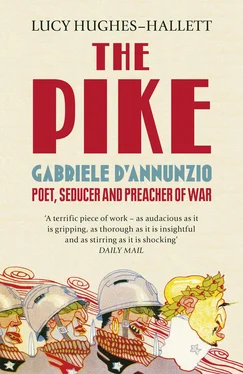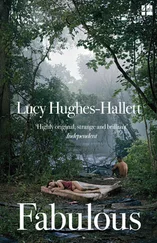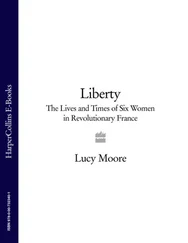He was voicing sentiments that would have found their echoes all over Europe. Marinetti had called war ‘the hygiene of Europe’. In the political rhetoric and the poetry of the period, civilian existence is grey, dim, morally compromised and physically grubby. The battlefield by contrast is bright, aglitter with weapons and flashing with joy. Above all it is clean. When Britain declared war Rupert Brooke proclaimed his gladness to ‘Leave the sick hearts that honour could not move/And half-men, and their dirty songs and dreary.’ Like d’Annunzio, Brooke saw the war as a saving freshness into which he could plunge ‘as swimmers into cleanness leaping’. In Germany, Thomas Mann welcomed the conflict as ‘a purging and a liberation’. ‘Let the storm come,’ cried the Hungarian Dezsö Kosztolányi, ‘and sweep out our salons.’
The morning after he arrived in Rome, d’Annunzio visited the minister Ferdinando Martini, who, as editor of the journal the Fanfulla della Domenica in the 1870s, had known him as a precocious schoolboy contributor. There is no record of their conversation. Contemporaries speculated that Martini must have spoken of the repudiation of the Triple Alliance and the Treaty of London. He probably did, even though he didn’t trust d’Annunzio. A few days earlier, advising that the King should stay away from Quarto, he had written: ‘D’Annunzio thinks only of himself and his own success … He has no political sense whatsoever, sometimes even, despite his marvellous genius, not even any common sense … he could easily compromise us.’ But the decision to go to war could not be implemented until parliament and people had been swayed in its favour. D’Annunzio could help.
That evening, speaking from his hotel balcony, d’Annunzio launched into his most furious oratory to date. He may by now have been speaking with the tacit approval of the government, but his language was dangerously seditious, the actions he sought to instigate were criminal. He attacked the advocates of peace in vitriolic terms. The very air of Rome stank of their treachery. Those who still hung back from war were traitors, ‘assassins’ of the patria, Italy’s executioners. Giolitti was strangling the nation with a Prussian rope.
D’Annunzio was openly advocating violent attacks on the people’s elected representatives. He called upon the Roman mob to take the law into their own hands. He urged his listeners to attack the appeasers who ‘lick the boots on sweaty Prussian feet’. He called for ‘stonings and arson’. His rhetoric was becoming ever more frenzied. ‘I tell you, there is treason here, in Rome! We are being sold like a herd of diseased cattle.’ He urged the people to hunt down anti-war deputies. ‘Form squads!’ (‘squadro’ was one of the many words the fascists would pick up from him). ‘Lie in wait. Seize them. Capture them!’ An observer reports that the applause when he paused was like a storm. When he resumed to denounce Giolitti in ever more vituperative terms (‘that diabolical old blubber-lipped hangman’), the storm ‘was transformed into a cyclone’.
D’Annunzio was high on his own eloquence, on the frenzy of the crowds he flattered and inflamed and on the prospect of blood. Fifty-two years old, he extolled the ‘ruthless purity’ of youth. A poet whose life’s work had been the threading together of obscure and beautiful words, he inveighed against verbiage and called for action, swift, cruel if need be, and unambiguous. ‘It is not the time for speaking but for doing.’ He ended by leading the crowd in the Risorgimento anthem, beating time with his little white hands while the people beneath bellowed out the refrain: ‘Let us join the cohort,/We are ready to die!/Italy has called!’ Tom Antongini reports that the Queen Mother, listening from behind the shutters of her palace window, was moved to tears.
That night Salandra sought a more secure mandate by offering to resign. The following day, 14 May, Rome was in uproar. The painter Giacomo Balla, in his hectic, swirling canvases, Forms Cry Long Live Italy and Patriotic Demonstration (both inspired by the turmoil of which d’Annunzio was part) conveys the violence and elation in the air. The Austrian embassy was cordoned off by infantry with bayonets fixed for fear of the mob. A crowd burst into the parliament building, the Palazzo Montecitorio, smashing furniture and terrifying the deputies. In the afternoon the King summoned Giolitti and asked him to form a government. Giolitti declined. His life was in danger. But it was not fear, but principle, that made it impossible for him to assume power. The King had signed the Treaty of London; his new premier would be obliged to implement it. Giolitti could not lead the country into a war to which he was so publicly and vehemently opposed. The King and Salandra had manoeuvred him into an impossible position. Declining the chance to govern, he lost his power to oppose.
That evening, d’Annunzio spoke at the Press Association and then moved on to Rome’s grand opera house, the Teatro Costanzi. Interrupting the scheduled performance, he stepped out onto the stage at the end of the first act. There he took it upon himself to make public the news that Italy would fight. His delivery was peremptory, dramatic (as a demagogue he had come a long way in the few days since he had delivered his piece of elaborate prose-poetry at Quarto). ‘Hear me!’ he began ‘Hear me! I have momentous things to tell you, things you don’t know. Keep silent. Listen to me. Then leap to your feet, all of you!’ Again he raved against Giolitti, ‘an icy lie armed with flexile cunning, as the horrible sac of an octopus is equipped with twining tentacles’ who ‘betrays the King, betrays the fatherland’. D’Annunzio urged ‘good citizens’ to take their vengeance. His speech was an incitement to murder. ‘If blood flows, such blood will be as blessed as that shed in the trenches.’ Afterwards some of his supporters hijacked a fire engine and used its ladders in an attempt to break into Giolitti’s house: they were driven off by the military guard.
The King invited Salandra to form a new government. Giolitti conceded defeat and left the city. The war party had carried out what historian Mark Thompson calls a ‘coup d’état in all but name’. The socialist leader Filippo Turati expressed his despair with the percipient words: ‘Let the bourgeoisie have its war. There will be no winners; everyone will lose.’ The road to war was open. But still d’Annunzio talked. The task he had set himself was greater than a simple change in government policy. He was assisting at the birth of a new, greater Italy. ‘The crowd howls like a woman in labour. The crowd writhes in giving life to its own destiny … Everything is ardour and clamour, creation and intoxication, peril and victory, beneath the murky sky of battle where the swallows flash and cry.’
Those hectic days in Genoa and Rome were to enter d’Annunzio’s personal mythology as ‘radiant May’, a period haloed in glory during which he created a masterpiece in a hitherto unknown art form. In 1906 he had watched his friend, the sculptor Clemente Origo, casting a bronze statue inspired by one of his own poems, a large and complex piece showing a centaur wrestling with a mighty stag. The scene in the workshop – the fierce heat, the courage of the foundry workers, the combination of artistry and danger – had haunted him. He used it in a novel. Now he repeatedly evoked it as an image of what he was doing to the Italian people. He was breaking up the decadent old forms of Italian society in order to make the nation anew, as a smith might smash up scrap metal ready for use in a new compound. He was cleansing his human material of its impurities. He was melting it down in the white heat of his eloquence. On 17 May he spoke on the Capitol Hill, and in his account of the occasion he likens his words to the blows with which the foundry man strikes out a plug to let the liquefied metal flow into the mould. ‘The tumult’ seems to him like a furnace’s fiery breath. The crowd is an incandescent mass of molten bronze ready to be shaped by his will. ‘All the mouths of the mould are open. A gigantic statue is being cast.’
Читать дальше












